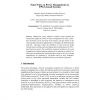Free Online Productivity Tools
i2Speak
i2Symbol
i2OCR
iTex2Img
iWeb2Print
iWeb2Shot
i2Type
iPdf2Split
iPdf2Merge
i2Bopomofo
i2Arabic
i2Style
i2Image
i2PDF
iLatex2Rtf
Sci2ools
FPL
1995
Springer
1995
Springer
Some Notes on Power Management on FPGA-Based Systems
Although the energy required to perform a logic operation has continuously dropped at least by ten orders of magnitude since early vacuumtube electronics [1], the increasing clock frequency and gate density of the current integrated circuits has appended power consumption to traditional design trade-offs. This paper explore the usefullness of some low-power design methods based on architectural and implementation modifications, for FPGAbased electronic systems. The contribution of spurious transitions to the overal consumption is evidenced and main strategies for its reduction are analized. The efectiveness of pipelining and partitioning inprovements as low-power design methodologies are quantified by case-studies based on array multipliers. Moreover, a methodology suitable for FPGAs power analysis is presented.
Related Content
| Added | 26 Aug 2010 |
| Updated | 26 Aug 2010 |
| Type | Conference |
| Year | 1995 |
| Where | FPL |
| Authors | Eduardo I. Boemo, Guillermo González de Rivera, Sergio López-Buedo, Juan M. Meneses |
Comments (0)

